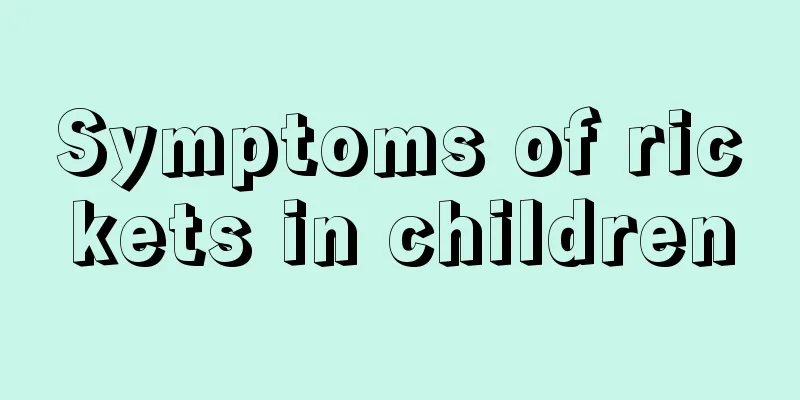What causes high TSH in newborns?

|
Neonatal tsh refers to the thyroid function status of the newborn, and many parents are prone to encountering the situation where their children have high tsh. High neonatal tsh is a symptom caused by the baby's thyroid function disease, which can easily damage the baby's mental health. There are many reasons for high neonatal tsh, among which there are certain genetic factors, which need to be treated in time.
TSH is a manifestation of congenital thyroid disease in newborns Causes 1. Congenital hypothyroidism (1) Absence or hypoplasia of the thyroid gland. Abnormal development of the thyroid gland during the embryonic period is a common cause. The human thyroid gland appears around the fourth week of gestational age. It originates from the endoderm between the first and second pharyngeal pouches. It begins as a median protrusion. As the thyroid gland develops, the thyroid primordium extends downward. By the 8th week of pregnancy, the normal position in the front of the neck is reached. If the thyroid gland is damaged by autoimmune pathological processes during its development, the thyroid gland cannot be formed or becomes dysplastic, resulting in thyroid deficiency or thyroid hypoplasia, and the thyroid gland cannot produce T4 and T3 or the production is reduced. In addition, the bound T4 and T3 in the mother's blood cannot pass through the placenta. Only a very small amount of biologically active FT4 and FT3 can pass through, but they cannot meet the needs of fetal growth and development. The thyroid binding globulin in the mother's blood increases due to the influence of pregnancy, so FT4 and FT3 decrease further. Such a small amount of FT4 and FT3 cannot meet the needs of the fetus. The fetus itself lacks hormones and cannot rely on the mother for supply, so hypothyroidism occurs. (2) Ectopic thyroid gland: When the thyroid gland extends downward during development, it stops somewhere on the way down. The gland is underdeveloped and has reduced function. This is more common in sublingual ectopic thyroid glands. Due to the different degrees of thyroid development, the clinical manifestations of hypothyroidism vary greatly, with only 14.5% to 33% of cases experiencing hypothyroidism. (3) Thyroid hormone synthesis disorder Enzyme defects in any link of the thyroid hormone synthesis process can lead to hypothyroidism. It is worth noting that hypothyroidism is an autosomal recessive genetic disease caused by hormone synthesis disorders, and 25% of siblings will be affected. In addition, due to the defect of iodine organogenesis, Pendred syndrome occurs, in which the patient has thyroid enlargement and sensorineural hearing loss. This disease is also an autosomal recessive genetic disease.(4) Thyroid hormone transport defect After entering the blood, most of the thyroid hormone is bound to proteins, and a very small part is FT4 and FT3. Thyroid hormones are transported to various tissues via carrier proteins to exert their physiological effects. The bound thyroid hormone and the free thyroid hormone are in a state of equilibrium, and it is the free thyroid hormone that exerts physiological effects. When the synthesis of the protein that transports thyroid hormone is defective, a large amount of inappropriate iodinated histidine is produced. They cannot be deiodinated and are excreted in the urine, which reduces the normal thyroid hormone level in the blood and causes hypothyroidism. (5) The body is insensitive to thyroid hormones (hormone insensitivity). There is a compensatory increase in T4 and T3 in the blood, and there is no abnormal binding protein. However, clinical manifestations of hypothyroidism such as growth delay and deafness and dumbness appear. This is mainly due to defects in the TSH receptors on the thyroid cell membrane or the thyroxine receptors in the body's tissue cells, which are insensitive and unresponsive to thyroid hormones. The secretion of TSH is not affected by the feedback of elevated thyroid hormones, which shows that the normal feedback function of the hypothalamus-pituitary-thyroid axis has been impaired. (6) Temporary hypothyroidism is not uncommon in clinical practice. It is commonly seen in neonatal hypothyroidism screening, and is more common in immature infants, twin fetuses and low-birth-weight infants with severe infections. ② Low T3 syndrome, which is a non-thyroid disease that affects thyroid function. Serum T3 is significantly reduced, T4 is low, and TSH is normal or high, but there is no clinical manifestation of hypothyroidism. The above two points may be related to the delayed development of the thyroid axis. As the primary condition improves, thyroid function gradually returns to normal. ③ If the mother takes antithyroid drugs and iodine for too long or in excessive doses during pregnancy, these drugs can pass through the placenta to the fetus, destroying the fetus' thyroid gland and causing illness.(7) Endemic cretinism occurs in areas where endemic goiter is prevalent. It is mainly caused by iodine deficiency in the soil and water sources, insufficient iodine intake by the mother, which leads to iodine deficiency in the fetus and insufficient synthesis of thyroid hormones, causing the disease. The main causes of congenital hypothyroidism are thyroid absence, ectopic thyroid and thyroid dysplasia. |
<<: How many days does it take for a newborn to see?
>>: What are the signs of normal hearing in a newborn?
Recommend
Newborn baby has trouble breathing when sleeping on his back
When the child is young, the mother wants to keep...
What should I do if my child has asthma and cough?
People of different age groups suffer from asthma...
How can I finish my homework quickly?
Doing homework is a task that students must compl...
What to do if your three-year-old baby wets the bed
It is normal for a three-year-old baby to wet the...
What to do if your child has a fever and convulsions
We know that children are prone to convulsions wh...
What to do if your child's face is scratched by nails
When children are young, they have a desire to ex...
How to raise children in poverty, raise boys' ambitions and girls' temperament
We must cultivate children's correct mindset ...
What tests should be done for hernia in children?
Many parents with children will encounter pediatr...
What is the standard height and weight for a two-year-old?
There are huge changes in infants every day. A tw...
Can I have hernia surgery if I have a cold?
Because the weather is always changing, it is eas...
Do three-month-old babies need to take a bath every day in winter?
When winter comes, the weather becomes very cold,...
What diseases does the baby's sleep sound represent?
Many parents who take care of their babies will f...
How to wean your baby off breast milk at eight months old
Many mothers know that weaning a baby is not an e...
What is the cause of cough asthma in children?
Cough-type asthma in children is often caused by ...
What to do if your 3 month old baby has a low fever
When the baby is more than three months old, he i...









